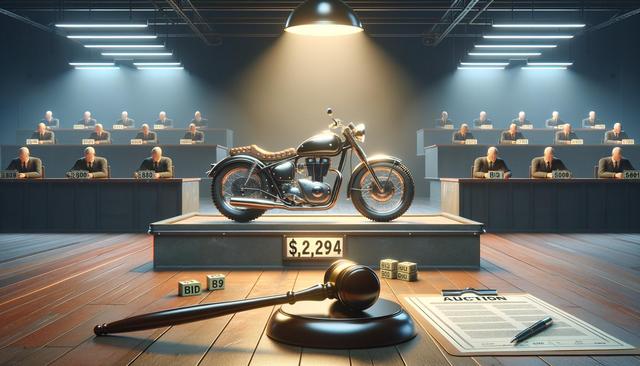Understanding How Motorcycle Auctions Work
Motorcycle auctions function as competitive marketplaces where buyers place bids on available bikes, often aiming to secure a good deal. These events can be held in person at auction houses or online through digital platforms. Whether you’re a seasoned rider or a newcomer to the world of motorcycles, understanding the auction process is essential. Bidders usually have the opportunity to inspect the motorcycles before the auction begins, and some auctions provide detailed condition reports. It’s crucial to register beforehand and understand the terms and conditions, including buyer’s premiums and payment deadlines.
There are typically two types of motorcycle auctions: public and dealer-only. Public auctions are open to everyone, while dealer-only auctions require a valid dealer license. Some auctions also include salvage or repossessed motorcycles, which can be appealing for those looking to restore or part out bikes. Knowing your budget and doing research on the motorcycles you’re interested in can go a long way in making a successful purchase.
Why Buy from a Motorcycle Auction?
Buying a motorcycle at auction can offer several advantages compared to traditional dealerships or private sellers. One of the main reasons people turn to auctions is the potential for cost savings. While there are no guarantees, motorcycles at auction often sell for less than their retail value. This is especially true for models with minor cosmetic damage or high mileage that may not appeal to the average buyer but are still mechanically sound.
Another reason to consider auctions is the variety available. Auctions often feature a wide range of makes, models, and years, including classic and rare bikes that are hard to find elsewhere. This makes auctions a valuable resource for collectors and enthusiasts looking for something specific. Additionally, some auctions include motorcycles from government fleets or corporate leases, which are typically well-maintained and come with detailed service records.
- Lower purchase prices compared to retail
- Wide selection of models and years
- Access to rare or vintage motorcycles
- Potential investment opportunities
Tips for First-Time Auction Buyers
For those new to motorcycle auctions, preparation is key. Start by researching the auction house or platform to ensure it has a good reputation. Look into the motorcycles being offered ahead of time and make a shortlist of those that interest you. If possible, attend a preview day to inspect the motorcycles in person. Pay close attention to the frame, engine, tires, and any signs of wear or damage. Bring a knowledgeable friend or mechanic if you’re unsure what to look for.
Set a budget and stick to it. It’s easy to get caught up in the excitement of bidding, but overspending can turn a good deal into a costly mistake. Understand the auction fees, which can include buyer’s premiums, title transfer charges, and taxes. Also, be aware of the payment methods accepted and the timeline for completing the transaction. Finally, arrange for transportation if needed, especially if the motorcycle isn’t in rideable condition.
- Do your homework on the auction and motorcycles
- Inspect bikes thoroughly before bidding
- Set a firm budget and account for fees
- Plan for payment and transport logistics
Online vs. In-Person Motorcycle Auctions
With the rise of digital platforms, online motorcycle auctions have become increasingly popular. They offer convenience and accessibility, allowing buyers to participate from anywhere. Listings often include detailed photos, condition reports, and sometimes even video walk-arounds. However, the downside is that you can’t physically inspect the motorcycle, so you’re relying heavily on the information provided. It’s important to only use reputable auction websites that offer buyer protections and transparent descriptions.
In-person auctions, on the other hand, offer a more tactile experience. You can see, touch, and even hear the motorcycles before making a bid. There’s also the chance to talk directly with auction staff or previous owners. For many, the atmosphere of a live auction adds excitement and energy to the buying process. If you live near an established auction house, attending in person might give you the confidence and assurance you need to make a well-informed decision.
- Online auctions offer convenience and wider access
- In-person auctions allow for direct inspection
- Both formats have unique advantages and risks
- Choose the format that suits your comfort level and goals
What to Watch Out for at Motorcycle Auctions
While auctions can be a great way to find a motorcycle, they also come with certain risks. One of the biggest concerns is buying a motorcycle with hidden issues. Unlike certified pre-owned bikes from dealerships, auction motorcycles are typically sold “as-is,” with no warranties or guarantees. This means you’re responsible for any repairs or maintenance after the sale. Always read the fine print and know what you’re committing to before placing a bid.
Another potential pitfall is overbidding. Competitive bidding can drive prices up quickly, leading to purchases that exceed market value. It’s also possible to get emotionally attached to a specific motorcycle and bid more than you originally intended. To avoid these scenarios, establish a bidding strategy and stick to it. Keep in mind that some motorcycles may have salvage titles, which can affect their resale value or insurability. Always verify the title status and history report when available.
- Be cautious of hidden mechanical or legal issues
- Understand the implications of “as-is” sales
- Don’t let emotions override your budget
- Check title status and vehicle history when possible
Conclusion: Finding Value in Motorcycle Auctions
Motorcycle auctions can be an exciting and rewarding way to purchase your next ride, especially if you’re prepared and informed. They offer the chance to find unique or valuable motorcycles at potentially lower prices, but they also require due diligence and smart decision-making. Whether you’re a collector seeking rare models, a rider looking for a cost-effective option, or a mechanic interested in project bikes, auctions provide a dynamic marketplace worth exploring. Take the time to understand the process, evaluate your options carefully, and approach each auction with a well-thought-out plan. With the right preparation, you can make a purchase that aligns with your needs and budget.







